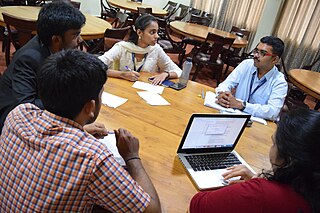Related Research Articles

Ethnography is a branch of anthropology and the systematic study of individual cultures. In contrast with ethnology, ethnography explores cultural phenomena from the point of view of the subject of the study. Ethnography is also a type of social research involving the examination of the behaviour of the participants in a given social situation and understanding the group members' own interpretation of such behaviour.

A focus group is a group interview involving a small number of demographically similar people. Their reactions to specific researcher-posed questions are studied. Focus groups are used in market research and studies of people's political views. The discussions can be guided or open. They can concern a new product or something else. The idea is for the researcher to learn about the participants' reactions. If group members are representative of a larger population, those reactions can be expected to reflect the views of that larger population. Thus focus groups constitute a research method that researchers organize for the purpose of collecting qualitative data, through interactive and directed discussions.
Qualitative psychological research is psychological research that employs qualitative methods.
Participant observation is one type of data collection method by practitioner-scholars typically used in qualitative research and ethnography. This type of methodology is employed in many disciplines, particularly anthropology, sociology, communication studies, human geography, and social psychology. Its aim is to gain a close and intimate familiarity with a given group of individuals and their practices through an intensive involvement with people in their cultural environment, usually over an extended period of time.

Qualitative research relies on data obtained by the researcher from first-hand observation, interviews, questionnaires, focus groups, participant-observation, recordings made in natural settings, documents, and artifacts. The data are generally nonnumerical. Qualitative methods include ethnography, grounded theory, discourse analysis, and interpretative phenomenological analysis. Qualitative research methods have been used in sociology, anthropology, political science, psychology, social work, and educational research. Qualitative researchers study individuals' understanding of their social reality.
Educational research refers to the systematic collection and analysis of data related to the field of education. Research may involve a variety of methods and various aspects of education including student learning, teaching methods, teacher training, and classroom dynamics.
Autoethnography is a form of qualitative research in which an author uses self-reflection and writing to explore anecdotal and personal experience and connect this autobiographical story to wider cultural, political, and social meanings and understandings. Autoethnography is a self-reflective form of writing used across various disciplines such as communication studies, performance studies, education, English literature, anthropology, social work, sociology, history, psychology, theology and religious studies, marketing, business and educational administration, arts education, nursing and physiotherapy.

Narrative inquiry or narrative analysis emerged as a discipline from within the broader field of qualitative research in the early 20th century. Narrative inquiry uses field texts, such as stories, autobiography, journals, field notes, letters, conversations, interviews, family stories, photos, and life experience, as the units of analysis to research and understand the way people create meaning in their lives as narratives.
Interpretative phenomenological analysis (IPA) is an approach to psychological qualitative research with an idiographic focus, which means that it aims to offer insights into how a given person, in a given context, makes sense of a given phenomenon. Usually these phenomena relate to experiences of some personal significance, such as a major life event, or the development of an important relationship. It has its theoretical origins in phenomenology and hermeneutics, and key ideas from Edmund Husserl, Martin Heidegger, and Maurice Merleau-Ponty are often cited. IPA is one of several approaches to qualitative, phenomenological psychology. It is distinct from other approaches, in part, because of its combination of psychological, interpretative, and idiographic components.
In the social sciences, coding is an analytical process in which data, in both quantitative form or qualitative form are categorized to facilitate analysis.
A part-time student is a non-traditional student who pursues higher education, typically after reaching physical maturity, while living off-campus, and possessing responsibilities related to family and/or employment. Part-time student status is based on taking fewer course credits in a semester than full-time students.
In qualitative research, a member check, also known as informant feedback or respondent validation, is a technique used by researchers to help improve the accuracy, credibility, validity, and transferability of a study. There are many subcategories of members checks, including; narrative accuracy checks, interpretive validity, descriptive validity, theoretical validity, and evaluative validity. In many member checks, the interpretation and report is given to members of the sample (informants) in order to check the authenticity of the work. Their comments serve as a check on the viability of the interpretation.
Borislav Jovanović, Montenegrin writer, poet, author essays and literary critic.

Kimberly Dark is an American performance artist, writer, and sociologist.
Jacket2 magazine is an online poetry and poetics magazine that publishes articles, reviews, interviews, commentaries, podcasts, and reissued archival material. The magazine is the new, interactive incarnation of Jacket magazine, the poetry and poetics magazine created and run by poet John Tranter in 1997. Kelly Writers House faculty director Al Filreis is the publisher and Kelly Writers House director Jessica Lowenthal is the associate publisher. The magazine is edited by Julia Bloch and Michael S. Hennessey. New material is added daily.
Languaculture is a term meaning that a language includes not only elements such as grammar and vocabulary, but also past knowledge, local and cultural information, habits and behaviours. The term was created by the American anthropologist Michael Agar.
Tom Konyves is a Canadian poet, video producer, educator and a pioneer in the field of videopoetry. He teaches creative visual writing at the University of the Fraser Valley.
Thematic analysis is one of the most common forms of analysis within qualitative research. It emphasizes identifying, analysing and interpreting patterns of meaning within qualitative data. Thematic analysis is often understood as a method or technique in contrast to most other qualitative analytic approaches - such as grounded theory, discourse analysis, narrative analysis and interpretative phenomenological analysis - which can be described as methodologies or theoretically informed frameworks for research. Thematic analysis is best thought of as an umbrella term for a variety of different approaches, rather than a singular method. Different versions of thematic analysis are underpinned by different philosophical and conceptual assumptions and are divergent in terms of procedure. Leading thematic analysis proponents, psychologists Virginia Braun and Victoria Clarke distinguish between three main types of thematic analysis: coding reliability approaches, code book approaches and reflexive approaches. They describe their own widely used approach first outlined in 2006 in the journal Qualitative Research in Psychology as reflexive thematic analysis. Their 2006 paper has over 59,000 Google Scholar citations and according to Google Scholar is the most cited academic paper published in 2006. The popularity of this paper exemplifies the growing interest in thematic analysis as a distinct method.

An interview in qualitative research is a conversation where questions are asked to elicit information. The interviewer is usually a professional or paid researcher, sometimes trained, who poses questions to the interviewee, in an alternating series of usually brief questions and answers. They can be contrasted with focus groups in which an interviewer questions a group of people and observes the resulting conversation between interviewees, or surveys which are more anonymous and limit respondents to a range of predetermined answer choices. In addition, there are special considerations when interviewing children. In phenomenological or ethnographic research, interviews are used to uncover the meanings of central themes in the life world of the subjects from their own point of view.
David Ian Hanauer is Professor of Applied Linguistics/English at Indiana University of Pennsylvania and the Lead Assessment Coordinator for the SEA-PHAGES program at the University of Pittsburgh. He is the editor of the Scientific Study of Literature journal, the official publication of IGEL. Hanauer is an applied linguist specializing in assessment and literacy practices in the sciences and poetic inquiry. He has authored or co-authored over 50 journal articles and book chapters as well as 8 books. Hanauer’s research agenda is typified by the combination of qualitative and quantitative methods and scientific measurement of concepts traditionally considered abstract, such as voice in written text., project ownership and poeticity.
References
- Balan, N. B. (2005). Multiple voices and methods: Listening to women who are in workplace transition. International Journal of Qualitative Methods, 4(4), Article 5. Retrieved [date] from https://www.ualberta.ca/~iiqm/backissues/4_4/pdf/balan.pdf
- Bhattacharya, K.. (2013). Voices, Silences, and Telling Secrets: The Role of Qualitative Methods in Arts-Based Research. International Review of Qualitative Research, 6(4), 604–627. http://doi.org/10.1525/irqr.2013.6.4.604
- Burdick, M. (2011). Researcher and teacher-participant found poetry: Collaboration in poetic transcription. International Journal of Education & the Arts, 12(SI 1.10). Retrieved [date] from http://www.ijea.org/v12si1/.
- Ratković, S. (2014). Teachers Without Borders: Exploring Experiences, Transitions, and Identities of Refugee Women Teachers from Yugoslavia. Retrieved from http://dr.library.brocku.ca/bitstream/handle/10464/5243/Brock_Ratkovic_Snezana_2014.pdf?sequence=1&isAllowed=y
- West, Kim; Bloomquist, Candace (2015). "Poetic Re-presentations on Trust in Higher Education". The Canadian Journal for the Scholarship of Teaching and Learning. 6 (2): 5. CiteSeerX 10.1.1.920.3110 . doi:10.5206/cjsotl-rcacea.2015.2.5.
- https://www.ualberta.ca/~iiqm/backissues/5_3/HTML/furman.html